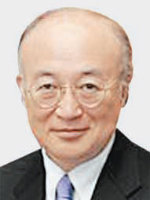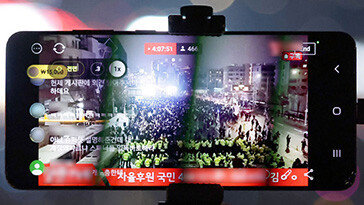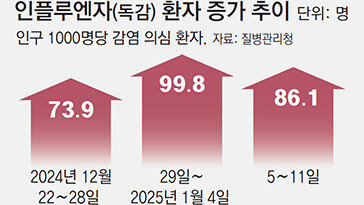??? ??? ??????? ???? “北 ???? ??? ?? ?? ???”
- ????
-
?? 2012? 3? 26? 03? 00?
??? ??? ???????(IAEA) ???? ???
??? ?? ?? ?? ??

“???????(IAEA)? ?? ??? ??? ?? ??? ?? ??? ???? ????.”
?? ???????? ???? ??? ??? IAEA ????(??)? 25? ?????? ?? ????? “?-? ??? IAEA? ??? ??? ?? ???? ??”? ??? ???.
??? 2? ??? ??? ? ????? ??, ?? ??? ??? ?? ????? ????? ?-? ??? ?? ????? ?? ??? ???? ??. ??? ??? IAEA ??? ??? ??????? ???. ?? ??? ? ? ??? ??? ‘????? ??? ??? ?? ? ???? ??? ??? ???? ???’? ??? “?? ??? ???? ??? ????? ???”?? ??? ??? ???.
?? “?? ??? ??? ??? ???? ??? ‘?? ???????(CPPNM)’ ??? ??? ??? ?? ?? ??? ??? ????”? ???. 1987? ??? ?? ??? ?? ??? ???? ???? ?? ???? ?? ???? ???? 2005? ??? ??? ??? ??, ?? ? ??? ???? ?? ?????? ??? ?? ??? ??? ????.
??? ??? ???????? ???? ?? “2010? 1? ??? ?? ?? ???? ?? ???? ??????(HEU)? ??? ?? ???? ???? ???? ?? 15??? CPPNM? ???? ? ?? ??? ???”? ????.
?? ?? ?????? 435? ?? ??? 80% ??? 20? ?? ? ???? ??? IAEA? ?? ???? ???? “20?? ???? ???? ??? ?? ???. ?? ??? ????”? ????.
??? ?? spear@donga.com
:: ??? ???? ?? ::
△1947? 5? ?? ??
△2002? 8? ?? ??? ????? ? ??? ???
△2005? 9? ? ?? ????
△2009? 12? IAEA ????
▼??? ??? ??? ?? ???▼
Yukiya Amano, Director General of International Atomic Energy Agency (IAEA), said IAEA can play an essential role in verifying the denuclearization of the Korean Peninsula.
And he hoped the Seoul Nuclear Security Summit will provide renewed impetus for countries that have not yet ratified the Amendment to the Convention on the Physical Protection of Nuclear Materials(CPPNM) to do so.
About possibility of Israeli attack on Iran, "I am against the use of force. Dialogue is the only way forward, dialogue must produce concrete results," said in an email interview with the Dong-A Daily. The details are as follows;
Q. The 2nd Nuclear Security Summit is about to open in South Korea. What do you expect the most to be discussed and produced out of the Seoul meeting?
Q. What is IAEA's goal for the Seoul Nuclear Security Summit?
A: I hope that the world leaders gathered here will agree to strengthen measures to prevent nuclear and other radioactive material from falling into the wrong hands. The IAEA provides a unique platform for strengthening nuclear security, as it has an extensive membership of 153 states.
I also hope the Summit will provide renewed impetus for countries that have not yet ratified the Amendment to the Convention on the Physical Protection of Nuclear Materials (CPPNM) to do so, in order that this vital link in the international legal framework can finally come into effect.
The original Convention covers only physical protection of nuclear material in international transport. But the Amendment would expand its coverage to include the protection of material in domestic use, transport and in storage, and would protect nuclear facilities themselves against acts of terrorism.
Q. The Washington Nuclear Security Summit had welcomed President Obama's call to secure all vulnerable nuclear material in four years to enhance nuclear security. Since then, two years have already passed. Is the '4 year lock-down initiative' still likely to be achieved?
A: Nuclear security threats are real and immediate, and need to be addressed with urgency. There has been real progress in nuclear security since the 2010 Summit, including securing a considerable amount of nuclear material around the world for example high enriched uranium from the Vinca site in Serbia. A further 15 countries have ratified the CPPNM Amendment, which is a crucial legal instrument in the nuclear security field. The Agency has also seen a rise in demand from Member States for its expert peer review missions to assess nuclear security on the ground, including requests from countries with mature nuclear programmes such as France, Sweden, the United Kingdom, and the United States. But there is still much more to be done.
Q. After the 1st nuclear security summit meeting, the Fukushima incident occurred, creating new circumstances regarding nuclear safety. Now the world is more aware of the close relationship between nuclear security and nuclear safety, because nuclear incidents are all dangerous, intentional or otherwise. What would be the most effective way to deal with the risks involving the peaceful use of nuclear energy?
A. Nuclear safety and nuclear security have common goal: to protect human health and the environment. The IAEA's safety standards and security guidelines, which provide a benchmark for high levels of safety and security, both state that practical measures in each of these two areas have to be designed with the other in mind. For example, the principle that power plants should be fitted with multiple safety systems, so that if one fails, another kicks in, is relevant both in preventing accidents and in guarding against possible sabotage. I have also set up a Nuclear Security Guidance Committee in which all Member States can help to develop best practices in nuclear security, taking account of safety considerations.
Q. After the Fukushima incident, some countries including Germany announced their intention to abandon nuclear power as a whole. How realistic do you assess such an approach? If the humankind is bound to use the nuclear energy for some time, what are the criteria that must be met?
A. One of the effectsof the Fukushima Daiichi accident has been to damage public confidence in nuclear power around the world, and this has led some countries mainly in Europe to turn away from nuclear energy. At the same time, others have continued with their plans to adopt or expand nuclear power programs while strengthening nuclear safety.
Global use of nuclear power will continue to grow in the coming decades, though at a slower rate than we had previously projected. The reasons why it may be interesting to individual countries have not changed: notably, concern about climate change, the desire for security of energy supply and the volatility of fossil fuel prices.
The most important thing is that nuclear power should be generated as safely and securely as is humanly possible. Lessons are being learned, changes are being made around the world, and nuclear power is now safer as a result. But we must never let down our guard on safety and security.
Q. IAEA recently issued a report that concerned about world's ageing nuclear plants. It shows that 80% of the 435 facilities more than two decades old at the end of last year. What is your suggestion to use nuclear power more safely?
A. As I said, safety is paramount. Many nuclear power stations have been operating for 20 years or more, but this does not mean they must be unsafe; it means that their age needs to be taken into account.
The IAEA's Nuclear Safety Action Plan sets out a blueprint for national and international action in 12 major areas, and represents a significant step forward in strengthening nuclear safety. For example, it encourages all countries with nuclear power programmes to carry out what have become known as "stress tests" of their nuclear power plants, and the IAEA has developed a methodology to help them do that. The Agency has also stepped up its peer review services to help countries assess and reinforce nuclear safety, and proposals are under way to reinforce the IAEA's Safety Standards.
North Korea
Q. At the North Korea and US high ranking officials meeting in February, North Korea agreed to a moratorium on long-range missile and nuclear tests as well as suspending nuclear facilities in Yongbyon. There's been suspicion that North Korea has Uranium Enrichment Facilities elsewhere. In that context, there are arguments that the recent agreement does not amount to be a genuine progress. How do you assess the recent development?
A. The IAEA has been insisting that it can play an essential role in verifying the denuclearization of the Korean Peninsula. We have received an invitation from the DPRK, and we have started consultations with the DPRK and other relevant actors.
Q. North Korea's main nuclear negotiator RiYong-ho participated at a forum organized by Syracuse University. Could you sense change in North Korean nuclear policy under the new leadership?
A. It is premature to say whether there has been a change or not. Verification is an important issue and I note in this regard that the Agreement between the US and DPRK contains a reference to the role of the IAEA.
Q. North Korea's nuclear envoy Ri Yong-ho told recently that IAEA nuclear monitors will soon be able to return to North Korea under a recent deal with the United States. When is your target date for monitors return to North Korea? Did you identify the possible activities that IAEA would undertake at Yongbyon with North Korea?
A. We have received an invitation from DPRK, and started consultations with the DPRK. I hope you understand that we cannot discuss the details of our consultation.
Q. What will be the missions of the monitors after they return to North Korea? And what do you think about all this inspection team's work will play out in the future while North Korea confined inspection teams work area at Yongbyon site?
A. Consultations are under way, but you will understand that I cannot say too much at this point on their current status.
Q. The international order wrought in the aftermath of the World War II seems to be wearing out. Particularly, the non-proliferation regime is under serious challenge. Would the North Korean and the Iranian nuclear ambitions eventually nullify the existing legitimacy of non-proliferation regime? What preparations are necessary to face the uncertainties of the future?
A. I understand that, despite all the challenges, the existing non-proliferation regime remains the essential structure within which the international community is operating. It is essential that all countries implement safeguards and other relevant obligations fully.
Iran
Q. Washington and its Western allies accuse Iran of trying to develop nuclear weapons under the cover of a civilian nuclear program. But Iran still denies such charges. What's your main concern about Iran's nuclear activities?
A. As I said in my recent report, the IAEA has serious concerns about possible military dimensions to Iran's nuclear programme, since the Agencyhas overall credible information that Iran has carried out activities relevant to the development of a nuclear explosive device. Iran has a case to answer, and I urge Iran to engage with us to address these concerns in a substantive way.
Q. How do you assess the recent IAEA inspection in Iran facilities?
A. The IAEA conducts regular inspections in Iran's declared nuclear facilities. In this respect, although the Agency continues to verify that Iran is not diverting its nuclear materials, we cannot provide credible assurances that there are no undeclared nuclear materials or activities in Iran. As a result, we cannot conclude that all nuclear material in Iran is in peaceful activities. Iran needs to engage with us to provide more information.
If you are referring to the two recent visits to Tehran by a senior team of IAEA experts, we engaged with Iran in a constructive spirit, but the fact remains that we could not reach agreement on a structured approach to solve all the outstanding issues. In addition, we believed that a visit to Parchin could provide a concrete start. We requested this well in advance, but were not granted access during our visits as we had asked.
Q. There's possibility that Israel could attack Iran. What should be done to prevent the war?
A. I cannot speculate on actions or policies of Member States of the IAEA. I am against the use of force. Dialogue is the only way forward, dialogue must produce concrete results, and the IAEA is ready to continue its dialogue with Iran.
Youngsik Kim spear@donga.com
-
- ???
- 0?
-
- ???
- 0?
-
- ???
- 0?



?? www.mannirunze.com - no allowed host